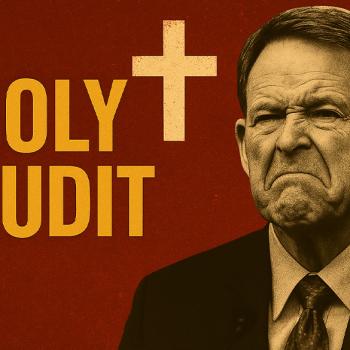A New Evangelical Manifesto: A Kingdom Vision for the Common Good is edited by David Gushee and includes chapters by him and eighteen other leading thinkers. In this two-part interview Greg Metzger interacts with Gushee and Brian McLaren, one of the other authors, on a number of themes related to the book.
David, in addition to your full-time duties at Mercer University you are a cofounder of the New Evangelical Partnership for the Common Good (NEP). That group figures prominently in the book and so I wondered if you could tell us a bit about the group and its purpose.
The NEP was founded to bear Christian public witness to a "new evangelical" vision. It involved the merging together of the work of Rich Cizik, Steve Martin, and myself. The agenda of NEP is stated in some detail at www.nepcg.org. Today, I am no longer on the board of NEP but am deeply supportive of the work of the organization.
One of the really intriguing things about the book is that it is kind of "three-books-in-one." As the editor of the book, can you describe the three different parts and what you are hoping to accomplish with the book?
The first part of the book focuses on what might be described as the inner life of evangelical Christianity, especially in the U.S. Its very presence suggests the need for some fresh reflection on who "we" are as a part of the Christian community, what is going well and what is going poorly among us.
The second part suggests that a healthy evangelicalism brings good news and good Christian love especially to those who have been marginalized, including those marginalized sometimes by evangelicals themselves. So this section offers chapter length treatment of what it might mean to love the trafficked, those suffering from preventable diseases, Muslims, women, children, and so on.
The last section is the most traditionally "public-policy" oriented. Those seven chapters offer fresh perspectives on the death penalty, nuclear weapons, climate change, abortion, peacemaking, consumerism, and torture.
I hope what has resulted is a real balanced mix of ecclesial, missional, and policy discussions.
In your introduction to the book you say wonder "whether the Christian Right has damaged the term 'evangelical' in this country beyond repair," yet you decided nonetheless to use the term as a key part of the vision for both the NEP and the book. Why do you think it is important that the term "be defined and defended one more (one last?) time," as you put in the book?
This was a hard call. Partly it is because the founders of NEP are old enough to care about contesting the meaning of the term. Partly it is because the term is still used regularly in the media, usually in ways that are disturbing to all but the Christian Right. Partly because the term has a deep range of meanings going back to the idea of the "evangel" that are worth trying to protect and clarify—one more time.
Richard Cizik, one of the cofounders with you of the NEP, has a fascinating chapter in the book and he says something that really resonated with me: "No matter the heresy, or bad judgment, organizations such of the National Association of Evangelicals (NAE) will choose to walk away from a controversy before they will confront the major figures of the Religious Right." I wonder what you think of that—is the theology and prudence of evangelicalism being diminished by the Religious Right, or is it just that some of us disagree with the politics of the Religious Right?
Over my twenty years of association with the evangelical world, I have regularly observed the effects of fear-based decision making, in which scholars or activists pulled their punches on a piece of writing or a statement or policy position so as not to garner the wrath of politically powerful Christian conservatives whose complaints about something or someone could sometimes amount to a veto or excommunication. I have also seen the problem of trying to keep an evangelical coalition together that can involve the evangelical right, center, and left, and in the end what results doesn't really please anyone. I am trying for the rest of my own career to never make a writing or activism decision tinged by fear of making anyone to my right (or left) unhappy. I think I am called to conscientious Christian faithfulness instead.
David, you are a world-class ethicist as well as a Christian activist and you contributed a fascinating chapter to the book on torture and I would be remiss if I didn't ask you about it. You say in the chapter something that I think many American evangelicals are not aware of, namely that there is widespread disagreement within the intelligence community about how effective the "enhanced interrogations," what you call torture, really were in gaining intelligence and preventing further attacks. Could you spell some of that evidence out for us?




